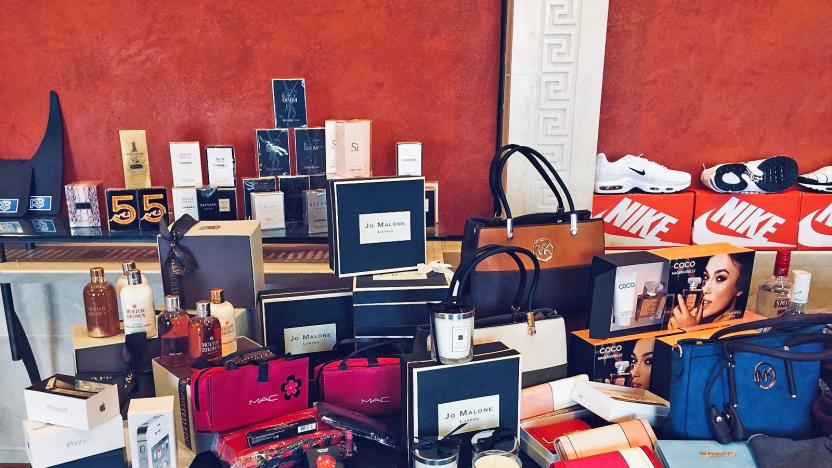counterfeits
Latest

Amazon may get law enforcement involved in more counterfeit cases
Amazon has been waging a war against counterfeits for years. The company has tried everything from charging high fees in order to sell big names to letting brands issue takedowns. Now, Amazon is planning to give more data on counterfeits to law enforcement, in hopes that will lead to more crackdowns, a source familiar with the program told Reuters.

The Decode app spots fakes with NFC
The global trade of counterfeit goods reportedly rakes in half a trillion dollars per year, which isn't good for anyone. (Except for the counterfeiters themselves, I suppose.) As the fakes industry continues to grow, brands are looking to technologies like RFID (radio-frequency identification) and NFC (near-field communication) to help authenticate their products. This is where Blue Bite, a startup based out of New York City, hopes to come in. It has developed a system that relies on an iOS app, called Decode, that can tell consumers if an item is real by simply tapping their phone on it.

Amazon needs to get a handle on its counterfeit problem
Chances are you wouldn't suspect that whatever you're buying from Amazon, whether it be clothing, sunglasses or a handbag, is fake. And, for the most part, that tends to true. But that doesn't mean you should trust that every product is legit. In fact, right now if you search for "Yeezys," a highly coveted pair of Adidas shoes, you'll get more than a thousand results that are clearly fake. Two dead giveaways are design flaws and an unlikely low price -- trust me, Adidas doesn't sell them for $20. The worst part is that some of them bear the seemingly trustworthy Fulfilled by Amazon (FBA) label. But all that really means is that the company is acting as the middleman between you and the actual seller.

Google took down nearly 2 billion 'bad ads' in 2016
Sketchy advertisers are all over the internet, and Google is doing everything it can to stop them from scamming users. According to a recent report on the matter, the search giant removed 1.7 billion ads from its advertising platform in 2016, more than double the amount compared to the year prior. The online housekeeping included 68 million ads for illegal pharmaceutical products, 80 million for content that misled and deceived consumers, as well as 112 million others that used trick-to-click methods.

Why do Instagram and Twitter want me to buy fake Yeezys?
It's not rare for me to come across ads for counterfeit goods, particularly as I'm browsing Instagram or Twitter. And although I don't have a Facebook account, I live with someone who does and know that's an issue there as well. Targeted advertising, the kind that knows exactly what brand of sneakers and streetwear I'm into, is the least of my worries here. My problem is the fact that Twitter and Facebook (which owns Instagram) are approving sponsored posts from retailers selling counterfeits. I know better, but there are many who may fall victim to these sorts of scams.

Department of Justice plans to crack down on counterfeits sold online
These days, people are resorting to the internet for most of their shopping. Who can blame them; the experience is far more convenient, and often cheaper, than going to traditional brick-and-mortar retail stores. One of the problems with this, however, is how easy it is to find and buy counterfeit goods online, and the US Department of Justice wants to put an end to that. Attorney General Loretta E. Lynch has announced a plan to fight intellectual property crimes in the country, which includes a grant funding of 3.2 million dollars for local and state law enforcement agencies. The idea behind the strategy, led by the FBI, is to work with third-party marketplaces (such as eBay or Amazon) to make sure they have "the right analytical tools and techniques to combat intellectual property concerns on their websites."

Keepin' it real fake: Apple strikes back
After enduring an onslaught of bogus iPods for years, Apple has apparently finally had enough of the knockoffs and is calling in the big guns. Is the company siccing its battery of attack lawyers on the shady manufacturers? No, this time Apple is unleashing a more fearsome force: the company is warning retailers to stay away from the clones, and has provided them with a cheat sheet to help them identify counterfeits. Somehow, we suspect that most dealers already know the difference between real and fake iPods (here's a hint: the real ones don't arrive mysteriously at your back door in an unmarked box), and that this is really Apple's way of sending them a not-so-subtle message: if you want to sell the real ones, stop selling the fakes. Of course, retailers probably see higher margins from the fakes, so they might be torn, but we're betting that even a hint of the wrath of Steve will be enough to get most of them to shut that back door forever.

